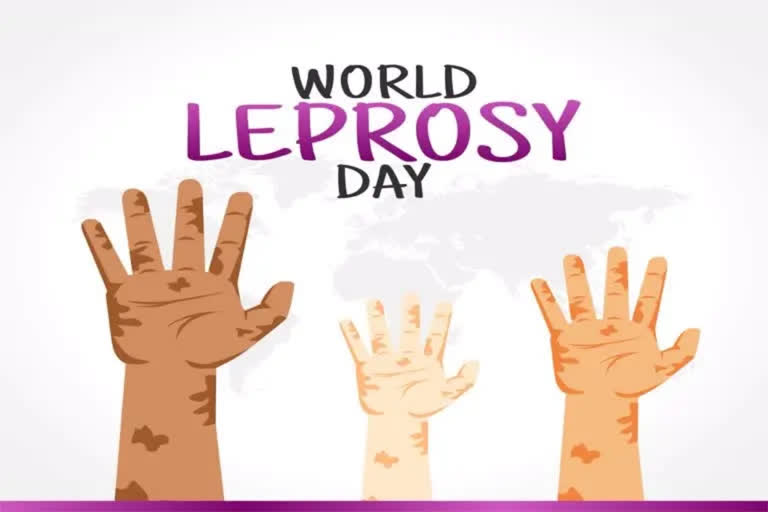Hyderabad: Our country has a lot of social stigma around leprosy. Even though it is a curable disease, due to a lack of awareness, people have many misconceptions about it and people suffering from it have to face social discrimination. In such situations, 'World Leprosy Day' is an opportunity to increase awareness about this disease, to try to make its treatment possible for every person suffering from it, and to make sure they do not have to face social discrimination.
This event is observed internationally on the occasion of the death anniversary of Mahatma Gandhi, who had compassion for people afflicted with leprosy, on the last Sunday of January. Mahatma Gandhi made efforts for the development of leprosy patients, providing treatment and facilities for them and creating awareness among the people about this disease. Many efforts have been made at the government and non-government levels to constantly spread awareness about this disease in our country.
Still, there has been no change in people's attitudes towards this disease. In the year 2023, this event is being observed under the theme “Act Now, End Leprosy” on Sunday, January 29th. This theme has been selected to convey certain objectives to the masses, which are as follows:
- Elimination is possible: We have the power and tools to stop transmission and defeat this disease.
- Act now: We need the resources and commitment to end leprosy. Prioritize leprosy elimination.
- Reach the unreached: Leprosy is preventable and treatable. Suffering from leprosy is needless.
World Leprosy Day was established in 1954 by French journalist and activist Raoul Follereau with two goals. First, to advocate for equal treatment of people affected by leprosy, and second, to re-educate the public about leprosy by correcting age-old misconceptions surrounding the disease. He chose the last Sunday of January to pay tribute to Mahatma Gandhi, as his works in the field of leprosy are known and considered worldwide, and his death anniversary (January 30th) coincided with the last Sunday of January.
Also read: Indigenous "Cervavac" vaccine can be very beneficial in preventing cervical cancer
Work is being done on this disease for years, under the National Leprosy Eradication Programmes in India. Although India was officially declared leprosy-free in 2005, if the statistics are to be believed, a large number of leprosy cases are still reported in the country. But it is a matter of satisfaction that due to the access to treatment for common people, and the facilities and efforts of the government and non-government organizations, there is a continuous increase in the figures for the complete recovery of its patients. According to the NLEP report for 2020-2021, 94.75 per cent of patients have been cured in India.
According to a report by the World Health Organisation, they aim to bring new leprosy cases to zero in 120 countries by the year 2030. The report further states that before COVID-19, about 200,000 people were diagnosed with leprosy every year globally. But, due to the pandemic, patients with leprosy had to face disruptions in their treatment. According to the WHO, approximately 208,000 people are currently infected with leprosy worldwide, and millions of people are living with leprosy-related disabilities, most of them in Asia, Africa and South America.
Dr Suraj Bharti, a dermatologist from Delhi, explains that leprosy is a chronic infectious disease. It is also known as 'Hansen's Disease' or 'Hanseniasis'. This infectious disease is caused by Mycobacterium leprae or Mycobacterium lepromatosis bacteria, which shows effects very slowly. Sometimes its symptoms can take up to 20 years to appear.
He explains that leprosy is not a highly contagious disease and its management and diagnosis are completely possible with timely treatment. He explains that if leprosy is detected on time, most of the cases can be cured within 6 to 12 months. But carelessness regarding the detection or treatment of this disease may lead to serious long-term nerve damage in the patients. While talking about its symptoms, along with the change in colour of the affected skin, some other symptoms are also considered, some of which are as follows:
- Light-coloured patches on the skin. Sometimes the affected skin may also become numb.
- Thickening or hardening of the skin in the affected area or increased dryness in that area.
- Muscle weakness or paralysis, especially in the hands and feet.
- Eye problems or sometimes blindness, etc.
On World Leprosy Day, government organizations and NGOs, organize many programs at the public and educational levels to spread awareness among the general public. Along with this, many organizations also organize programs to raise funds for the treatment, management, research and upliftment of patients with this disease. Apart from this, activities like rallies, marathons, seminars and workshops are also organized on this occasion to provide treatment to the patients and to rehabilitate those suffering from the disease.



